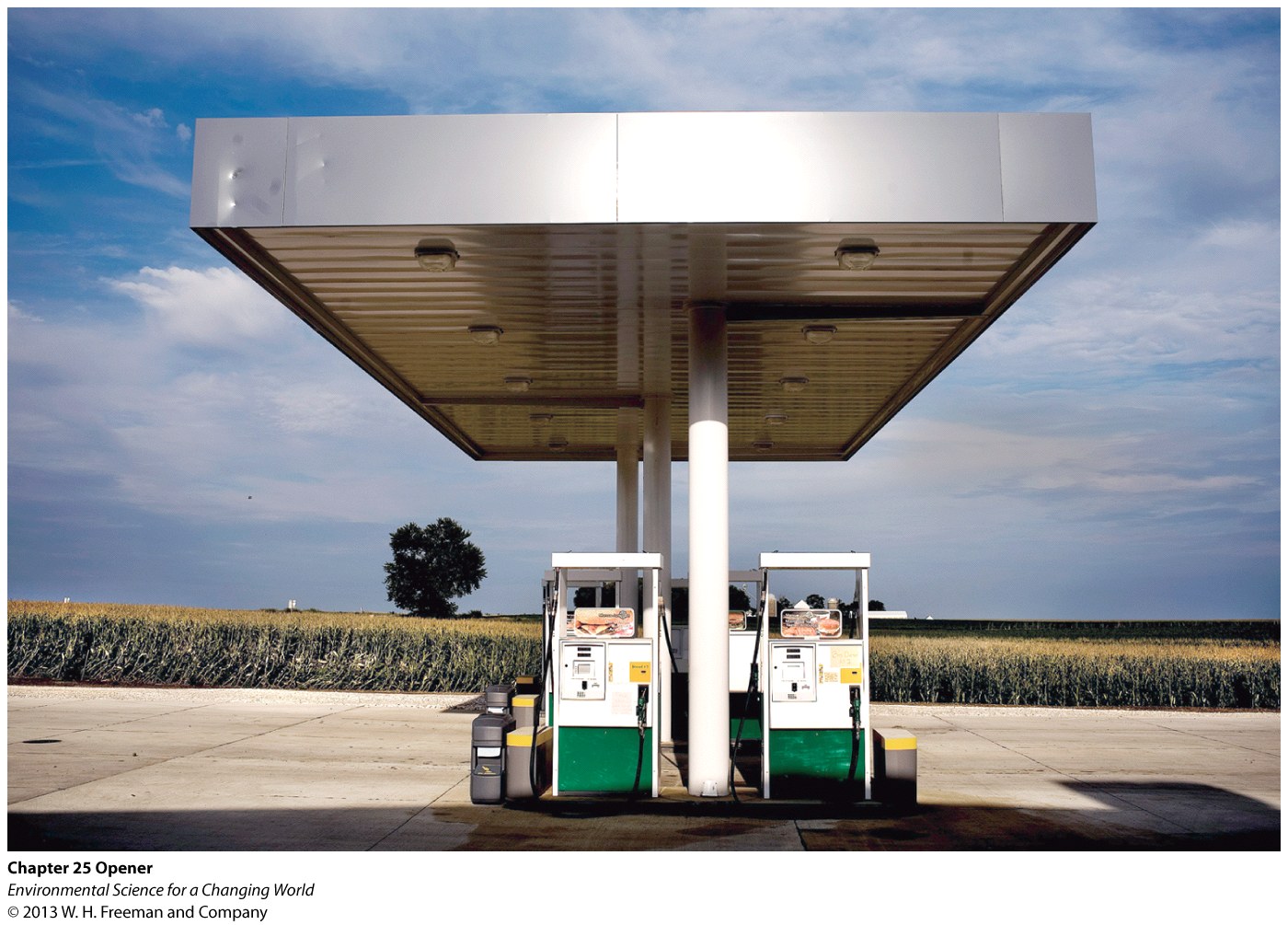
Chapter 25. Chapter 25: Biofuels
What role does conservation and energy efficiency play...?

Guiding Question 25.5
What role does conservation and energy efficiency play in addressing our mobile fuel needs, and what are some ways we can pursue these?
Why You Should Care
The time has come to face facts: We can’t continue to use fuel at the rates we do now, regardless of where it comes from. Humans were short-sighted not to realize that the rates of fossil fuel consumption typical for most of recent history weren’t sustainable. Should we throw up our hands, get depressed, or adopt a fatalistic attitude about it all? Of course not. This is an exciting time of change—who knows what the world will look like in the next few decades? Chances are that, even if fossil fuels still dominate as the energy source for vehicles for years to come, our vehicles will be much more efficient and conserve resources. A decade ago, few would have predicted the meteoric rise in popularity of hybrid vehicles, but it happened. People are realizing that conservation and efficiency don’t necessarily mean compromising their quality of life. Taking steps to reduce energy use saves money, and energy independence is an important goal for any country. Even if we can replace fossil fuels with renewable and sustainable fuels, we will still need to conserve because the land resources for producing biofuels are finite. There are many individual, local, and broad-scale steps you can take to improve your fuel use and conservation. One of the best ways to reduce fuel use is not to use it; many state and local programs are in place to provide financial assistance for people who buy or rent homes near their work so that their commute can be reduced.
1.
Of the following transportation choices, the MOST environmentally friendly is:
| A. |
| B. |
| C. |
| D. |
2.
Passed in 2007, the United States Energy Independence and Security Act requires that ______ billion gallons of renewable fuels as alternatives to fossil fuels will be produced annually by 2022.
| A. |
| B. |
| C. |
| D. |
3.
Habits that improve fuel mileage include all of the following EXCEPT:
| A. |
| B. |
| C. |
| D. |
4.
The best ways to replace fossil fuels in the near future include all of the following EXCEPT:
| A. |
| B. |
| C. |
| D. |
5.
Chances are that you or someone you know owns and drives a personal vehicle. Look up that vehicle on www.fueleconomy.gov by clicking on "Find a Car."
1) How much are the estimated annual fuel costs for the vehicle you looked up? $.
2) Now go to Benefits>Save Money. Here, you can calculate your savings in fuel costs if you were to drive a more fuel-efficient vehicle. You may want to adjust the average fuel costs for your region and the total mileage based on your driving habits. About how many more miles per gallon would a car have to achieve to save you $1,000 per year?
3) Now go to Save Money & Fuel>Gas Mileage Tips>Driving More Efficiently. What is the BEST habit to adopt to improve your gas mileage?
| A. |
| B. |
| C. |
| D. |
Short-Answer Questions
Suppose you are advising the mayor of your town on which alternative fuel choices the city should adopt based on environmental soundness and economy. What general and regional factors would you have to consider before recommending the following fuels?
1) Conventional biodiesel:
2) Corn bioethanol:
3) Switchgrass bioethanol:
4) Algae biodiesel:
5) Garbage/landfill methane:
6) Sewer sludge bioethanol:
2) Corn Bioethanol has a higher EROEI now than when it was first introduced, but it is still more-or-less carbon neutral and does not produce as much energy as many other sources. It would probably only be a sensible option in corn-growing areas, but government subsidies may make it more attractive elsewhere. Improved pricing still does not solve the lower-than-average environmental friendliness, however.
3) Switchgrass bioethanol has a much better EROEI than corn, especially if grown as part of a LIHD system. Moreover, if it is grown on marginal land instead of farmland, it avoids the issue of competing with food production. It is also very good in terms of carbon output, usually being far on the carbon-negative side. Drawbacks would be that the technology has not yet developed to reliably meet supply demands and the fact that switchgrass should be growable locally to prevent using fossil fuels to transport it.
4) Besides the cons listed for conventional biodiesel, algae biodiesel really isn't commercially available yet, so unless the mayor wanted to sponsor a development program, this wouldn't be a good option. To reduce freshwater usage, it would be best to locate an algae operation where saltwater could be pumped readily as well, so this may not work in a landlocked area.
5) Harvesting methane from landfills is a well-established technology used by many cities already. The only regional considerations would be if the local landfills would be appropriate for the methane operations. If the sole goal of the fuel search is to find a fuel for vehicles, then methane isn't the best choice unless the city were preparing to adopt electric vehicles since a common use for methane is to burn it to produce electricity. Environmentally, reclaiming methane is a sound idea since it is a much more potent greenhouse gas than carbon dioxide. (Carbon dioxide receives more attention because there is a lot more of it in the atmosphere, making its total effect greater.)
6) This option is a great way to reduce the amount of waste going into landfills and circumvents the social problems associated with the other proposed use of recycling sludge: using it as fertilizer.
Activity results are being submitted...